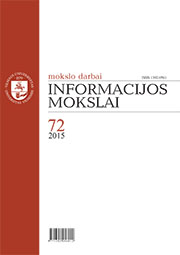Naujos platformos lietuvių literatūros kūrinių sklaidai ir skaitymo skatinimui: problemos analizė
New platforms for the access to works of the Lithuanian literature and reading promotion: a case study
Author(s): Regina Varnienė-Janssen, Neringa RačkauskaitėSubject(s): Library and Information Science, Archiving, Information Architecture, Library operations and management, Electronic information storage and retrieval, Methodology and research technology
Published by: Vilniaus Universiteto Leidykla
Keywords: reading promotion; e. book; e. services; e-classical library; phenomenological methodology; Value Added 2-3-4 development concept; Quality inspection; Lithuania;
Summary/Abstract: The main scientific problem of the article, which has never been addressed in Lithuania, is the analysis of changes in the accessibility of works of the Lithuanian literature after the implementation of the project “Presenting Works of the Lithuanian Classical Literature Online” in the Martynas Mažvydas National Library of Lithuania in 2011–2014, the creation of an e-library of works of the Lithuanian literature, and the impact of the established e-services on the access to works and the level of reading engagement. The investigation applied a constructive phenomenological methodology, the European Commission‘s 2-3-6 concept substantiating the added value of e-publishing and John W. Creswell‘s qualitative research methods. The use of these methodological tools for understanding the users’ subjective experience in utilizing the established e-services brings the methodological novelty to this investigation. Drawing on the 2-3-6 concept and the practices applied in Lithuania, the following concepts of the added value of the e-library and e-services are analyzed:1. Content creation. It should be based on a targeted selection of documents and the optimum visualization of the aggregated digital information.2. Content packaging. It includes presenting on the as broad scale as possible the reason for the origination of a digitized work and its content and accessibility.3. Delivery support and services. It should permit the user to obtain the metadata and primary sources in a convenient way (via the Internet including mobile devices).4. Market making. It should be built on implementing tools for copyright protection and their monitoring, service evaluation, promotion of the digital content and reading by using e-books, and permitting the users to read digitized works on various devices. The use of the results of the qualitative investigation and the application of the principles of the phenomenological research enabled to identify and substantiate the correlation between the concepts of the added value of the e-library and the trends of strategies for promoting e-books and reading: ensuring a permanent access to works of the Lithuanian literature and their diversity online, retaining high requirements for the quality of e-books and e-services, and increasing the awareness of works of the Lithuanian literature by using additional tools of market making. The qualitative investigation has proved that the digitization of works of the Lithuanian literature and their presentation online eliminate the restrictions which are present in case of books in traditional formats. The Internet and mobile devices enable obtaining the needed book without leaving one’s home, thus allowing to use budget resources in a more expedient way. The analysis of Lithuania’s strategic documents and the qualitative investigation proved that the development and use of the e-library and e-services should be grounded on the following principles:1. Complexity: integration of national campaigns; permanent work within state and municipal cultural, educational and social security institutions; and initiatives of local communities and private individuals.2. Modern approach: promotion of reading and development of language skills. The related projects should be based on the newest research on reading habits of children, young people and adults. It is essential to take into account the development of modern technologies and their impact on reading.3. Differentiation: promotion of reading and development of language skills. The effort should be oriented to citizens of various age and social groups by using appropriate means.4. Partnership: a close cooperation among various activity fields.5. Integrity: development of skills of physically handicapped people and old persons.
Journal: Informacijos mokslai
- Issue Year: 2015
- Issue No: 72
- Page Range: 74-101
- Page Count: 28
- Language: Lithuanian

